- Home
- William Kennedy
Legs - William Kennedy Page 4
Legs - William Kennedy Read online
Page 4
He led the way out the back door and along a stream that ran parallel to the highway, and at a narrow point we leaped across the stream and into the woods, all soft with pine needles, quiet and cool, a young forest with the old granddaddy trees felled long ago by loggers, and the new trees—pines, white birches, maples, ash—tall but small of girth, reaching up for sunlight. A cat named Pistol followed at Jack's heel like an obedience-trained dog. He was an outdoor cat and had picked us up as we left the back steps, where he'd been sitting, gnawing gently on a squirrel that wasn't quite dead and that still had the good sense to run away whenever Pistol relaxed his teeth. But that old squirrel never got far from the next pounce.
Jack walked rapidly, stepping over the carcasses of old trees, almost running, moving uphill, slipping but never falling, surefooted as the cat. He turned around to check me out and at each turn motioned to me with his right hand, backs of fingers upright toward me, bending them toward himself in a come-on gesture. He said nothing, but even today I can remember that gesture and the anxious look on his face. He was not mindful of anything else except me and his destination and whatever obstacle he and the cat might have to dodge or leap over: an old log, jutting rocks, half-exposed boulders, fallen limbs, entire dead trees, the residual corpses of the forest. Then I saw a clearing and Jack stopped at its edge to wait for me. He pointed across a meadow, a golden oval that rolled upward, a lone, dead apple tree in the center like the stem and root of a vast yellow mushroom turned upside down. Beyond the tree an old house stood on the meadow's crest and Jack said that was where we were going.
He walked with me now, calmed, it seemed, by the meadow or perhaps the sight of the house, all that speed from the forest faded now into a relaxed smile, which I noticed just about the time he asked me: "Why'd you come down here today. Marcus?"
'"I was invited. And I was curious. I'm still curious."
"I thought maybe I could talk you into going to work for me."
"As a lawyer or riding shotgun?"
"I was thinking maybe you'd set up a branch of your office in Catskill."
That was funny and I laughed. Without even telling me what he wanted of me, he was moving me into his backyard.
"That doesn't make much sense," I said."My practice is in Albany and so is my future. "
"What's in the future?"
"Politics. Maybe Congress, if the slot opens up. Not very complicated really. It's all done with machinery."
"Rothstein had two district attorneys on his payroll."
"Rothstein?"
"Arnold Rothstein. I used to work with him. And he had a platoon of judges. Why did you get me a pistol permit?"
"l don't really have a reason."
"You knew I was no altar boy. "
"It cost me nothing. I remember we had a good conversation at the Kenmore. Then you sent me the Scotch."
He clapped me on the shoulder. Electric gesture. "I think you're a thief in your heart, Marcus."
"No, stealing's not my line. But I admit to a corrupt nature. Prolligacy, sloth, licentiousness, gluttony, pride. Proud of it all. That's closer to my center."
"I'll give you five hundred a month."
"To do what?"
"Be available. Be around when I need a lawyer. Fix my traffic tickets. Get my boys out of jail when they get drunk or go wild."
"How many boys?"
"Five, six. Maybe two dozen sometimes."
"Is that all? Doesn't seem like a full-time job."
'"You do more, I pay you more."
"What more might I do?"
"Maybe you could move some money for me. I want to start some accounts in other banks up this way, and I don't want to be connected to them. "
"So you want a lawyer on the payroll."
"Rothstein had Bill Fallon. Paid him a weekly salary. You know who Fallon was?"
"Every lawyer in the U. S. knows who Fallon was."
"He defended me and Eddie when we got mixed up in a couple of scrapes. He wound up a drunk. You a drunk?"
"Not yet."
"Drunks are worthless. "
We were almost at the old house, a paintless structure with all its windows and doors boarded up and behind it a small barn, or maybe it was a stable, with its eyes gouged out and holes in its roof. The panorama from this point was incredible, a one-hundred-and-eighty-degree vision of natural grandeur. I could see why Jack liked the spot.
"I know the old man who owns this," he said. "He owns the whole field, but the son of a bitch won't sell. He owns half the mountainside. A stubborn old Dutchman, and he won't sell. I want you to work on him. I don't care what the price is."
"You want the house? The field? What?"
"I want all you can get, the whole hill and the forest. I want this yellow field. Everything between here and my place. Things are going good now and they can only get better. l want to build up here. A big place. A place to live good. I saw one in Westchester, a great place I liked. Roomy. A millionaire owned it. Used to work for Woodrow Wilson. Had a big fireplace. Look at this rock."
He picked up a purple stone lying at our feet.
"Plenty of this around," he said. "Have the fireplace made out of it. Maybe face part of the house with it. You ever see a house faced with purple rock?"
"Never."
"Me either. That's why I want it."
"You're settling in here in the Catskills then, permanently?"
"Right. I'm settling in. Plenty of work around here." He gave me a conspiratorial smile. "Lots of apple trees. Lots of thirsty people." He looked over at the house. "Van Wie is his name. He's about seventy now. He used to farm a little up here a few years ago." Jack walked over to the shed and looked inside. Grass was growing inside it, and hornets, birds, and spiders were living in the eaves. Birdshit and cobwebs were everywhere.
"Eddie and me did the old man a favor in here one day," Jack said, reminding me and himself, and, in his way, reminding me to remind the old man too that when Jack Diamond did you a favor, you didn't turn your back on him. He turned suddenly to me, not at all relaxed now, but with that anxious face I saw as he was moving through the forest.
"Are you with me?"
"I could use the money," I said. "I usually lose at pinochle."
* * *
I can recall now the quality of the light at that moment when I went to work for Jack. The sun was dappling his shoulders as he peered into the shadows of the empty stable with its random birdshit, with his faithful cat Pistol (Marion later had a poodle named Machine Gun), rubbing its sides against Jack's pants legs, his head against Jack's shoe, the sun also dappling the black and white of Pistol's tiger tom fur as it sent its electricity into Jack the way Jack sent his own vital current into others. I mentioned to Jack that he looked like a man remembering something a man doesn't want to remember and he said yes, that was a thousand percent, and he told me the two interlocking memories he was resisting.
One was of another summer day in 1927 when old man Van Wie came down the meadow past the apple tree, which was not dead then, and into the forest where Jack and Eddie Diamond were firing pistols at a target nailed to a dead, fallen tree, recreation therapy for Eddie, for whom the house, which would later be described as Jack's fortress, had been purchased: mountain retreat for tubercular brother.
The gunfire brought the old man, who might have guessed the occupation of his neighbors but not their identities; for Jack and Eddie were the Schaefer brothers back then, a pseudonym lifted from Jack's in-laws; and Jack was not yet as famous a face as he would be later in that same year when Lepke bullets would not quite kill him. The farmer did not speak until both Jack and Eddie had given him their full attention. He then said simply, "There is a mad cat. Will you shoot it before it bites on my cow? It already bit on my wife." Then the old man waited for a reply, staring past his flat nose and drooping mustache, which, like his hair, he had dyed black, giving him the comic look of a Keystone Kop; which was perhaps why Jack said to him, "Why don't you call the troopers?
Or the sheriff. Have them do it."
"They'd be all week," said the old man. "Might be it's got the rabies."
"How'll we find him?" Jack asked.
"l chased him with the pitchfork and he ran in the barn. I locked him in. "
"Is the cow in there?"
"No. Cow's out in the field."
"Then he can't get at the cow. You got him trapped."
"He might get out. That's a right old barn."
Jack turned to Eddie, and they smiled at the prospect of making a mad cat hunt together, the way they had once hunted rats and woodchucks in the Philadelphia dumps. But Eddie could not walk all the way to the farmer's house, and so they went back and got Jack's car, and with old man Van Wie they drove to the barn which had not yet had its eyes gouged out or holes made in its roof. And with guns drawn and the farmer behind them with his pitchfork, they entered the barn.
"What's going to stop him from biting hell out of us?" Jack said.
"I expect you'll shoot him 'fore he gets a chance at that," the old man said.
Jack saw the cat first, yellowish orange and brown and curled up on some hay, and quiet. It looked at them and didn't move, but then it opened its mouth and hissed without sound.
"That don't look like a mad cat to me," Jack said.
"You didn't see it bite on my wife or leap on the lampshade and then try to run up the curtain. Maybe it's quiet 'cause I whacked it with the fork. Maybe I knocked it lame."
"It looks like Sugarpuss," Eddie said.
"I know," Jack said. "I'm not going to kill it."
The mad cat looked at the men, orange and silent and no longer disturbed by their intrusion or fearful of their menace.
"You shoot it if you want," Jack said.
"I don't want to shoot it," Eddie said.
"Look out," old man Van Wie said, pushing past the brothers and sticking his pitchfork through the cat, which squealed and wriggled and tried to leap off the fork. But it was impaled and the farmer held it out to the brothers, an offering.
"Now shoot it," the old man said.
Jack kept his arm at his side, pistol down, watching the cat squeal and squirm upside down on the fork. Eddie put three bullets in its head, and the old man, saying only "Obliged" and grabbing a shovel off a nail, carried the carcass out to the yard to bury what remained of madness. And Jack then was triggered into his second cat memory of eighteen years before, when he was twelve, when he said to Eddie that he wanted to furnish the warehouse and Eddie did not understand. The warehouse was enormous, longer than some city blocks, empty for as long as they had been , alive. It's was made of corrugated metal and wooden beams and had scores of windows that could be broken but not shattered. Jack discovered it, and with Eddie, they imagined its vast empty floor space full of automobiles and machinery and great crated mysteries. At one end an office looked down on the emptiness from second-story level. There was no staircase to it, but Jack found a way. He rigged a climbing rope, stolen from a livery stable, over a wooden crossbeam, the stairway's one remnant. He worked two hours to maneuver a loop upward that would secure the rope, then shinnied up. It was 1909 and his mother had been dead two months. His brother was eight and spent two days learning how to shinny up to the office. The brothers looked out the office windows at a fragment of Philadelphia's freight yards, at lines of empty boxcars, stacks of crossties, piles of telegraph poles covered with creosote. They watched trains arrive and then leave for places they knew only from the names painted on the cars—Baltimore and Ohio, New York Central, Susquehanna, Lackawanna, Erie, Delaware and Hudson, Boston and Albany—and they imagined themselves in these places, on these rivers. From the windows they saw a hobo open a freight-car door from inside, and they assumed he'd just awakened from a night's sleep. They saw him jump down and saw that a bull saw, too, and was chasing him. The hobo had only one shoe, the other foot wrapped in newspaper and tied with string. The bull outran him and beat him with a club, and when the hobo went down, he stayed down. The bull left him where he fell.
"The bastard," Jack said. "He'd do the same to us."
But the Diamond brothers always outran the bulls. Out scrambled them beneath the cars.
Jack brought a chair to the office and a jug of water with a cork in it, candles, matches, a slingshot with a supply of stones, half a dozen pulp novels of the wild West, a cushion, and, when he could steal it from his father's jug, some dago red. He kept the hobo's hat, which was worn through at the crown from being fingered and had spots of blood on the brim. Jack took it off the hobo after he and Eddie went down to help him and found he was dead. The hobo was a young man, which shocked the brothers. Jack hung the hat on a nail in the office and let no one wear it. The brothers were asleep in the office the day the orange cat came in. It had climbed one of the wooden pillars and found its way along a crossbeam. A dog was after it, barking at the foot of the pillar. Jack gave it water in the candle dish, petted it, and called it Sugarpuss. The dog kept barking and Jack fired stones at it with his slingshot. When it wouldn't leave, Jack shinnied down, clubbed it with a two-by-four, cut its throat, and threw it out by the crossties.
Sugarpuss remained the mascot of the brothers and the select group of friends they allowed up the rope. It lived in the warehouse, and all the gang brought it food. During the winter Jack found Sugarpuss outside, frozen in the ice, its head almost eaten off where another animal had gotten it. He insisted it be given a decent burial and immediately got another cat to replace it. But the second cat ran away, an early lesson in subtraction for Jack.
* * *
We came out of the woods onto the highway and walked back toward Jack's house. A car passed us, and a middle-aged man and woman waved and tooted at Jack, who explained they were neighbors and that he'd had an ambulance take their kid to Albany Hospital, some thirty miles away, about six months back when the local sawbones didn't know what ailed the boy. Jack footed the bill for examinations and a week's stay in the hospital, and the kid came out in good shape. An old woman down the road had a problem with her cow after her shed collapsed, and so Jack paid for a new shed. People in Acra and Catskill told these stories when the papers said Jack was a heartless killer.
Jack's Uncle Tim was working on the rosebushes when we reached the house. The lawn had been freshly cut, some grass raked into piles on the front walk. Tamu was watering the flower beds of large and small marigolds, dahlias, snapdragons, on the sunny side of the brown shingled house. The Bowers reached up toward a second-story window where, it was authoritatively reported in the press at a later date, Jack had his machine guns mounted. The fortress notion was comic but not entirely without foundation, for Jack did have floodlights on the house to illuminate all approaches, and the maple trees on the lawn were painted white to a point higher than a man, so anyone crossing in front of one was an instant target. Jack installed the lights back in l928 when he was feuding with Schultz and Rothstein, right after a trio of hirelings tried to kill Eddie in Denver. Eddie went to Denver because the Catskills hadn't solved his lung problems, and Denver must have helped, for when they shot at him he leaped out of his car and outran the killers. One killer, when he saw Eddie'd gotten away, grabbed a bull terrier pup in front of somebody's house and shot off one of its paws, an odd substitute for murder. But then I guess in any realm of life you solve your needs any way you can.
Jack and I stood on the lawn and watched the grooming of the landscape. Domestic felicity. Back to the soil. Country squirearch. It didn't conform to my preconceptions of Jack, but standing alongside him, I had to admit it didn't sit so badly on him either.
"Pretty good life you've got here," I told him. He wanted to hear that.
"Beats hell out of being at the bottom of the river," he said.
"A striking truth."
"But this is nothing, Marcus, nothing. Give me a year, maybe even six months, you'll see something really special."
"The house, you mean, the purple house?"
"The house, the grounds, this whole
goddamn county."
He squinted at me then and I waited for clarification.
"It's a big place, Marcus, and they pack in the tourists all summer long. You know how many speakeasies in this one county? Two hundred and thirty. I don't even know how many hotels yet, but I'm finding out. And every goddamn one of them can handle beer. Will handle beer."
"Who's servicing them now?"
"What's the difference'?"
"I don't know what the difference is, except competition."
"We'll solve that," Jack said. "Come on, let's have some champagne."
Pistol, who had followed us out of the woods and along the road, pounced on a mole that made the mistake of coming out of his tunnel. The cat took him to the back steps and played with him alongside the carcass of the squirrel, who had died of wounds. Or perhaps Pistol had finished him off when he decided to take a walk with us. He let the mole run away a little, just as he'd let the squirrel, then he pounced.
'We were hardly inside the house when Alice called out to Jack, "Will you come here please?" She was on the front porch, with Oxie and Fogarty still on the sofa. They were not moving, not speaking, not looking at Alice or at Jack or at me either when we got there. They both stared out toward the road.
Alice opened the canary cage and said to Jack, "Which one do you call Marion'?"
Jack quickly turned to Fogarty and Oxie.
"Don't look at them, they didn't tell me," Alice said. "I just heard them talking. Is it the one with the black spot on its head ?"
Jack didn't answer, didn't move. Alice grabbed the bird with the black spot and held it in her fist.
"You don't have to tell me—the black spot's for her black hair. Isn't it? Isn't it?"
When Jack said nothing, Alice wrung the bird's neck and threw it back in the cage. "That's how much I love you," she said and started past Jack, toward the living room, but he grabbed her and pulled her back. He reached for the second bird and squeezed it to death with one hand, then shoved the twitching, eyebleeding corpse down the crevice of Alice's breasts. "I love you too," he said.
That solved everything for the canaries.

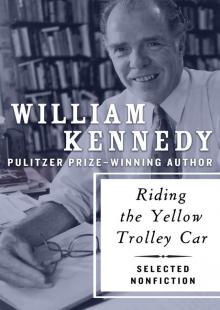 Riding the Yellow Trolley Car: Selected Nonfiction
Riding the Yellow Trolley Car: Selected Nonfiction Changó's Beads and Two-Tone Shoes
Changó's Beads and Two-Tone Shoes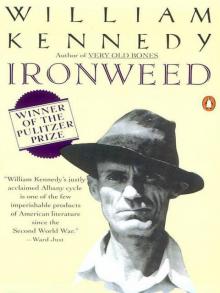 Ironweed
Ironweed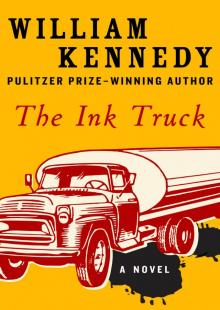 The Ink Truck
The Ink Truck Billy Phelan's Greatest Game
Billy Phelan's Greatest Game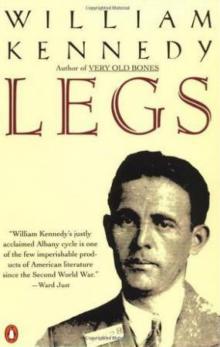 Legs
Legs Very Old Bones
Very Old Bones The Last Mission
The Last Mission The Flaming Corsage
The Flaming Corsage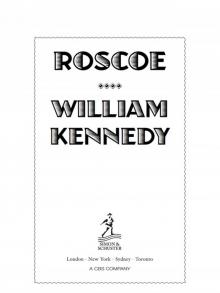 Roscoe
Roscoe Quinn's Book
Quinn's Book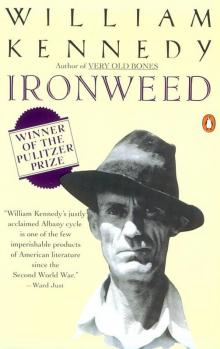 Ironweed (1984 Pulitzer Prize)
Ironweed (1984 Pulitzer Prize)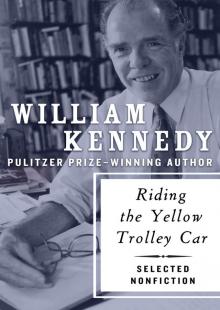 Riding the Yellow Trolley Car
Riding the Yellow Trolley Car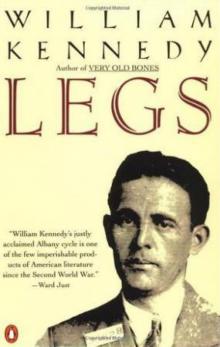 Legs - William Kennedy
Legs - William Kennedy